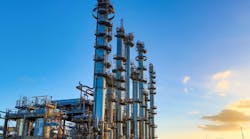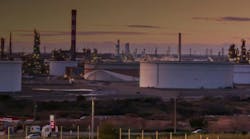By an OGJ correspondent
RIO DE JANEIRO, Dec 20 -- Petroleo Brasileiro SA (Petrobras) plans to invest 1.1 billion reals ($291.8 million) in Brazil's largest refinery, Paulinia, in São Paulo state, through 2005.
That includes 165 reals already spent this year. Most of the proposed investment, 795 million reals, is earmarked to boost Paulinia's diesel treatment and refining capacities, as well as set up a coking unit. Petrobras will provide 29% of the total investment, the rest to come from international funding, officials said.
With revenues projected at 17.8 billion reals this year, up 10% from 2001, the refinery is expected to boost its daily refining capacity to 60 million l. in 2005 from 54.2 million l. currently.
Petrobras has invested heavily in knowledge and technology to ensure the conversion of heavy crude residues into higher market demand light and noble oils, said Cláudio Fonseca M. dos Santos, manager of Fluid Catalytic Cracking, coking and separation, at Cenpes, Petrobras's research and development center.
He said six new delayed coking units (DCU) are expected to be completed at various refineries by 2010, to convert bottom-of-the-barrel oil into higher value products.
Petrobras currently has 4 DCU in operation: 2 at the Cubatão refinery, and 1 each at the Pauliniaand Betim plants. It has completed the basic design phase for three more.
Refinery upgrades needed
A recent study by Brazil's finance ministry concluded that Brazilian refineries in 3 years will be unable to cope with the volumes of oil that must be processed under the country's plans to become oil self-sufficient by 2005. It recommended government subsidies for the construction of new refineries.
The proposed Renor refinery at Ceará, with a refining capacity of 220,000 b/d of oil, could partially resolve the problem, ministry officials said. However, the Renor project is stalled by lack of investor interest.
Petrobras controls 98% of Brazil's refinery capacity, which totals more than 1.96 million b/d. Of the 13 refineries in Brazil, 11 belong to Petrobras.
Meanwhile, Petrobras is contemplating reducing its diesel imports, said the National Fuel Distributors Association (Sindicom). It said Brazil consumes 30 billion l./year of diesel and imports one quarter of its needs.
Petrobras incurred losses from its diesel imports in recent months because it was prevented from adjusting its domestic market price during the presidential campaign (OGJ Online, Oct.4, 2002). Officials said local price markups are needed because sharp depreciation of the real has made diesel imports more expensive. The real has lost about 40% against the US dollar this year.
Petrobras has stopped importing naphtha because of rising costs, leaving Brazilian petrochemical companies to make those purchases. Petrobras also wants to quit importing LPG products as well, Sindicom said.

